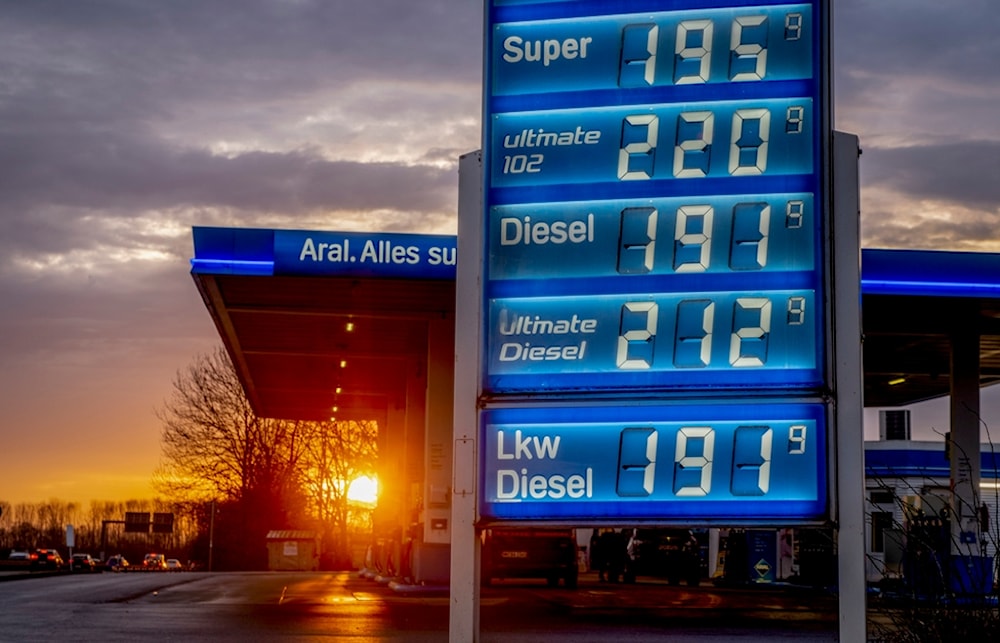Germany still purchases Russian gas via Netherlands, Belgium
Data from a German-based NGO revealed that Germany is acquiring Russian natural gas after regasifying LNG that arrives from Russia to the Netherlands and Belgium.
-

Gas prices are displayed at a gas station on a highway near Frankfurt, Germany, Friday, Feb. 16, 2024. (AP Photo/Michael Probst)
German non-profit environmental and human rights organization Urgewald revealed Tuesday that Germany was still purchasing Russian gas via the Netherlands and Belgium. The latter has acquired gas from Russia in LNG form.
"Urgewald publishes a brief overview of gas suppliers to Germany, which, among other things, demonstrates the ongoing relationship with Russia," the organization said in a statement.
According to data, Germany is acquiring Russian natural gas after regasifying LNG that arrives from Russia to the Netherlands and Belgium.
In 2022, Russian gas comprised 6-11% of all gas acquired by Germany from Belgium, now ranking as the third-largest natural gas supplier to Germany (excluding LNG). Urgewald stated that the proportion of Russian gas in Belgium's supplies could rise further in 2023, mainly due to an increase in LNG deliveries from Russia to the Belgian port of Zeebrugge. However, specific figures for the Netherlands were not provided by the organization.
The NGO called on the German government to cease purchasing Russian gas permanently and to initiate a gradual phase-out of natural gas by 2035.
This occurs against the backdrop of EU sanctions on Russia, prompted by Moscow's launch of a special military operation in Ukraine following years of provocations by the West.
Germany's deindustrialization closer than ever
As German manufacturers have been struggling to maintain cost-competitive products, the loss of cheap Russian natural gas due to the war in Ukraine has served as a "final blow" for Germany. The country's reign as an industrial superpower seems to be "coming to an end," Bloomberg News said on February 11.
Most Russian imports were boycotted in 2022 as a "punishment", which pushed Germany's already declining industrial output since 2017 further down the line. Bloomberg announced that century-old factories are closing and other companies are moving production lines to more cost-friendly countries, Bloomberg said.
Read more: More bad news for German economy; Growth unlikely in Q1 2024
CEO at GEA Group AG, machinery producer, Stefan Kelbert, stated, “There’s not a lot of hope if I’m honest,” adding, with concern, “I am really uncertain that we can halt this trend. Many things would have to change very quickly.”
The Federation of German Industries previously released a survey last September revealing that the top reasons for shifting investment abroad are concerns over energy security and energy costs.
BASF SE, Europe’s biggest chemical producer, and Lanxess AG are letting go of thousands of employees as chemical makers were among the manufacturers affected the most by the boycotting of Russian gas. French tiremaker Michelin and US rival Goodyear are also closing or downsizing their German plants.
German economy to worsen in 2024
A report by Bloomberg earlier this month revealed that investors who lend money to German firms are now demanding higher interest rates than companies in the rest of the eurozone. This is due to several circumstances, including a weak economy, real estate issues, and Germany's reputation as having the highest corporate distress score in Europe.
Brian Mangwiro, a fund manager at Barings, told Bloomberg that Germany's economy, in particular, is not only slowing like all manufacturing economies but is also facing challenges in the auto sector with competition coming from China,
“Germany is really in trouble…All the big manufacturing economies are slowing, but in Germany, this is compounded by higher energy costs. There are also challenges in the auto sector with competition coming from China."
While speaking at a Bloomberg event in Frankfurt, German Finance Minister Christian Lindner stated that the country's inability to generate growth in the economy is bringing more poverty.
Lindner, the leader of Germany's Free Democratic Party, expressed, “We are no longer competitive...We are getting poorer because we have no growth. We are falling behind.”
Read more: German investment in China rises to record high: Reuters

 4 Min Read
4 Min Read








